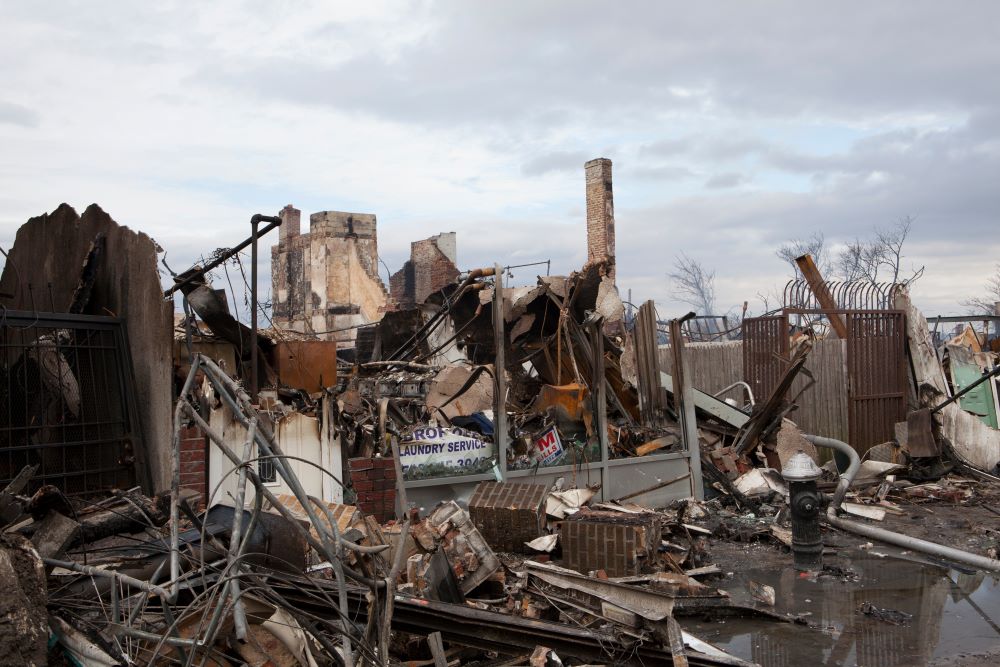
Disaster Recovery by a Commercial Demolition Company
In times of calamity, every moment matters. Recovery delays may result in more harm, higher expenses, and longer downtime. That’s why having a trustworthy partner on your side is essential to handling the fallout with accuracy and knowledge. Here at Maxton Demo, we’re experts in offering disaster recovery services that are unparalleled in terms of efficacy and efficiency.
Our knowledgeable team of experts, who have years of expertise in the field, is prepared to manage any kind of calamity, from man-made accidents like fires or structural failures to natural disasters like earthquakes or floods. We recognize the urgency of the issue and act quickly to evaluate the harm, create a thorough rehabilitation plan, and carry it out with the highest care.
OUR SERVICES
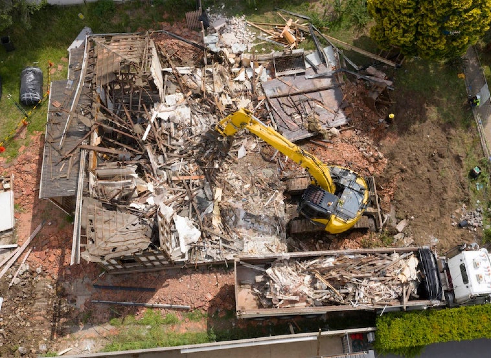
Structure Demolition. Residential, Commercial & Industrial
If your structure poses a health, safety, or environmental risk, demolition can prevent costly citations or fatal accidents. While this may seem daunting, you are just a phone call away from having your residential demolition done professionally, responsibly, and at a great price.
Talk to a Demolition Specialist Now! 916.249.5001
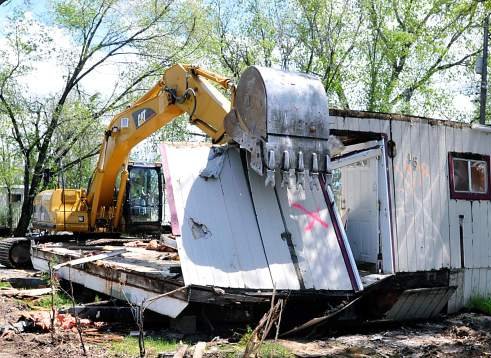
Mobile Home Demolition
We demolish and haul away mobile homes. Any size, anywhere, anyhow. We are fast, clean and competitive. We serve most of Northern California. There are many factors to consider when removing or demolishing your old trailer, mobile home, or manufactured home like: the processes involved, costs, time, contractors, debris, and permits.
Talk to a Demolition Specialist Now! 916.249.5001
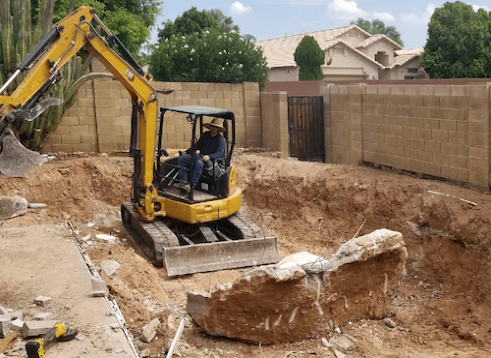
Pool Demolition
When removing a pool in Sacramento, California with the professional demolition team of Maxton Demo, you’re guaranteed peace of mind from beginning to end. From your initial request for an estimate to clean-up, you can expect our pool demolition process that’s completely professional and safe.
Talk to a Demolition Specialist Now! 916.249.5001
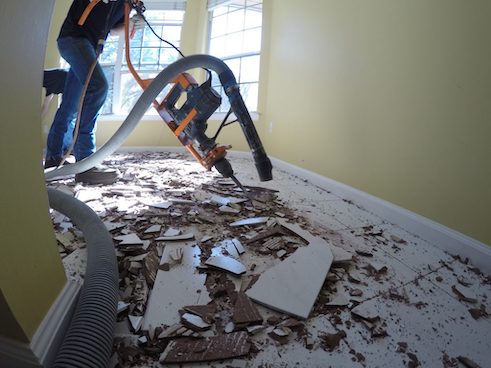
Floor Demolition
Flooring demolition, like any other major home renovation work, requires a specific set of skills and tools to be performed properly. You need experts in flooring demolition to get you the best floors possible. Contact us to find out more about how we can help you today.
Talk to a Demolition Specialist Now! 916.249.5001
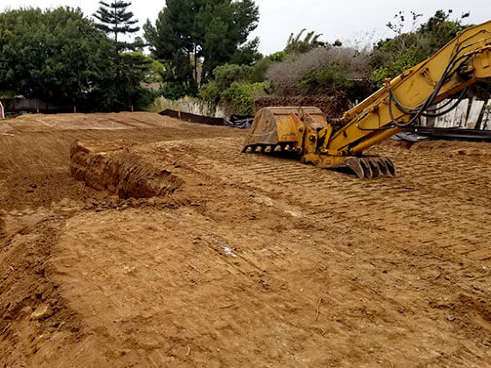
Grading & Excavating
If you need an experienced excavator and grader in Sacramento, call us today. One of the many reasons that residential, commercial, and industrial customers choose to work with us is because we’re able to provide a broad range of services to help construction-related projects get done in less time and at a reduced cost.
Talk to a Demolition Specialist Now! 916.249.5001

Roof Snow Removal
Heavy snow & ice dams can cause significant roof and home damage. Roof Snow removal is our specialty during the winter months. Serving the Sacramento, California area for 10 years, we can get your roof snow removed and promise a quick response and reasonable rates.
Talk to a Demolition Specialist Now! 916.249.5001
The Significance of Planning for Disaster Recovery
Planning for disaster recovery is an essential component of any project involving commercial destruction. Businesses may limit downtime, minimize financial losses, and guarantee everyone’s safety by putting in place a well-thought-out strategy. In the case of a tragedy, preparation enables a better coordinated reaction, facilitating quick action to lessen the effects and hasten the healing process.
Developing plans to handle different situations, evaluating vulnerabilities, and identifying possible hazards are all necessary components of effective disaster recovery planning. It also entails creating communication guidelines, specifying roles and duties, and guaranteeing that the required resources are available. Businesses may more effectively safeguard their resources and reputation by devoting time and energy to emergency preparedness.
A thorough disaster recovery plan shows a dedication to safety and resilience in addition to improving readiness. Stakeholders, staff, and customers are given confidence by it, which highlights the company’s commitment to sustainability and continuity in the face of difficulty.
Typical catastrophe types in commercial demolition projects
A variety of calamities might affect commercial demolition operations, which can provide serious obstacles to recovery attempts. Structure collapses, fires, the release of hazardous materials, and natural occurrences like storms or earthquakes are examples of common catastrophe types. There are distinct dangers associated with each of these catastrophes, and successful response and recovery require certain practices.
For instance, structural collapses need quick action to safeguard the area, evaluate the damage, and stop more structural instability. Natural catastrophes need collaboration with local authorities, reinforcing of structures, and evacuation protocols.
For the purpose of creating a thorough disaster recovery plan, it is essential to comprehend the various catastrophes that may arise during commercial demolition operations. Businesses are able to reduce interruptions, preserve assets, and ensure the safety of project participants by foreseeing these risks and planning appropriately.
Putting a Commercial Demolition Disaster Recovery Plan into Practice
In commercial demolition projects, putting a disaster recovery plan into practice calls for meticulous planning, effective communication, and prompt action. The plan’s effectiveness rests on well-executed implementation techniques that optimize resources, prioritize activities, and attend to urgent demands. Businesses may minimize operational interruptions and expedite the recovery process by adhering to established norms and processes.
A disaster recovery plan’s activation, damage assessments, resource mobilization, and stakeholder communication are all crucial stages in its execution. Ensuring openness throughout the process, coordinating recovery efforts, and making well-informed choices all depend on timely and accurate information exchange. Businesses may guarantee a prompt and effective reaction to calamities by setting up clear channels of communication and assigning duties.
Frequent training sessions, scenario simulations, and exercises may help staff members be ready to carry out the disaster recovery plan efficiently. Businesses can increase cooperation, reduce the possibility of mistakes during a real emergency, and improve reaction times by making sure staff members understand their roles and duties. In commercial demolition operations, planning and training are critical elements of a successful disaster recovery plan.
Crucial Tools and Materials for Commercial Demolition and Disaster Recovery
Effective catastrophe recovery in commercial demolition operations requires the proper tools and supplies. The pace and effectiveness of the recovery process may be greatly impacted by the availability of critical resources, which can range from large machines for debris removal to specialist tools for structure stability. Businesses may reduce downtime and speed up recovery efforts by investing in high-quality equipment and guaranteeing access to critical resources.
For the removal of waste, the demolition of buildings, and the transportation of materials, machinery like cranes, excavators, bulldozers, and dump trucks is essential. Drones, 3D imaging, and remote monitoring systems are examples of advanced technology that may help with damage assessment, recovery operation planning, and progress tracking.
Furthermore, emergency supplies, first aid kits, and personal protective equipment are necessary to guarantee the safety and wellbeing of workers on the job.
To optimize the efficiency of equipment and resources in disaster recovery, critical elements include working with reputable suppliers, performing routine maintenance on equipment, and instructing staff on correct use. Businesses are better able to react to emergencies quickly and efficiently if they maintain their equipment, restock supplies as required, and keep up with emerging technology.
Instruction and Readiness for Recovering from Disasters in Commercial Demolition
The cornerstones of a successful disaster recovery strategy in commercial demolition projects are readiness and training. Businesses may improve their workforce’s crisis preparedness and reactivity by funding training initiatives, holding frequent exercises, and encouraging a safety-aware culture. Teams that are well-prepared are better able to manage crises, plan rescue operations, and guarantee everyone’s safety.
A variety of subjects should be included in training programs, such as first aid methods, equipment operation, danger identification, communication protocols, and emergency response procedures. Businesses may enable staff to act decisively and confidently amid crises by offering thorough training to people at all levels. Frequent skill evaluations, scenario-based training, and refresher courses may help reinforce instruction and pinpoint areas that need work.
Businesses can emphasize readiness by doing routine inspections, keeping emergency supplies on hand, and updating contact lists, in addition to providing formal training. Businesses may reduce risks, improve response times, and increase overall resilience to catastrophes by proactively addressing any gaps in preparation. Being prepared is a lifelong process that needs constant assessment and modification to guarantee that one is ready for anything.
Selecting a Trustworthy Commercial Demolition Firm for Emergency Recovery
A crucial choice that might affect how a recovery operation turns out is choosing a reputable commercial demolition firm for disaster recovery services. Businesses should think about experience, knowledge, reputation, and resources when selecting a partner. Reputable demolition businesses with a track record of completed catastrophe recovery projects may have the certainty and trust required to handle situations with expertise and speed.
Seek out a commercial demolition business with a committed staff of experts versed in emergency response and recovery, as well as one that specializes in disaster recovery services. Examine the organization’s qualifications, licenses, and adherence to relevant industry guidelines to guarantee excellence and security throughout all activities.
Check references, check reviews, and ask for case studies to get a sense of the company’s reputation for disaster recovery.
When working with a business demolition firm for catastrophe recovery, communication is essential. Throughout the rehabilitation process, make sure the business keeps lines of communication open, sends out frequent updates on its progress, and asks for input. Establishing an open and cooperative approach is conducive to the development of trust, accountability, and the timely achievement of goals.
Businesses may feel secure in the knowledge that their recovery requirements are in competent hands when they collaborate with a respectable and trustworthy commercial demolition firm for catastrophe recovery. Throughout the whole process, a reliable partner will put safety, quality, and customer happiness first, in addition to accelerating the recovery process. Make informed decisions to guarantee a smooth and effective recuperation process.
Disaster Recovery’s Importance in Commercial Demolition
A crucial component of commercial demolition projects is disaster recovery, which requires thorough preparation, readiness, and collaboration with a reputable demolition firm. Businesses may improve their resilience to disasters and guarantee everyone’s safety by realizing the value of disaster recovery planning, evaluating and reducing risks, putting successful recovery plans into practice, and allocating funds for resources and training.
To handle crises with assurance and effectiveness, choose a reliable commercial demolition business with catastrophe recovery experience. Businesses may expedite the recovery process, reduce interruptions, safeguard their assets, and preserve their brand by choosing a partner that places a high priority on safety, quality, and communication. Disaster recovery involves proactive preparedness for calamities as well as guaranteeing a prompt and efficient reaction in the event of the unexpected. It goes beyond just reacting to crises.
You can rely on Maxton Demo to be your go-to partner for effective and dependable disaster recovery services when calamity hits. With our dedication to quality, security, and client happiness, we are prepared to help you overcome obstacles, resume operations, and quickly get back on track. Get in touch with us right now to find out more about our catastrophe recovery services and how we can provide precise and knowledgeable assistance for your business demolition projects.
Commercial Demolition Companies’ Function in Post-Disaster Reconstruction
Naturally occurring catastrophes like hurricanes, earthquakes, and wildfires may leave a path of devastation; therefore, it’s critical to rebuild swiftly and effectively. Commercial demolition firms play a crucial role in this process since they have the knowledge and tools needed to remove damaged buildings and waste.
These businesses facilitate the start of rebuilding by quickly clearing the debris left by a catastrophe, which speeds up the healing process for the impacted areas.
Time is of the essence in post-disaster settings, and commercial demolition firms excel in this regard. Their capacity to evaluate structural integrity, schedule demolition, and carry out clearing operations on time guarantees that reconstruction work may get underway without needless delays. This prompt response reduces the safety concerns connected with unstable buildings left standing after a catastrophe and speeds up the process of restoring infrastructure.
To further expedite the rebuilding process, commercial demolition firms work closely with a range of stakeholders, such as construction teams, insurance companies, and government organizations. These businesses support a smooth transition from demolition to rebuilding by coordinating activities and exchanging crucial information, which helps to create a unified strategy for returning normality to disaster-affected communities.
Categorizations of Incidents Needing Commercial Demolition Services
Commercial demolition firms must step in after many sorts of calamities to enable efficient cleaning and reconstruction efforts. Situations like building collapses, industrial accidents, and strong storms may cause major structural damage that has to be repaired by professionals with experience in demolition.
Following these catastrophes, commercial demolition firms’ specialist services are crucial for reducing hazards and getting building sites ready for rehabilitation.
In addition, landslides, tornadoes, and floods can leave behind damaged buildings and large amounts of debris that endanger public safety. Commercial demolition firms are prepared to manage the intricacies involved in tearing down these kinds of buildings, guaranteeing a complete and effective clearing of the impacted regions. In the wake of catastrophic occurrences, their ability to maneuver through difficult terrain while adhering to safety regulations makes them indispensable collaborators.
When man-made catastrophes like explosions or building collapses occur, commercial demolition contractors are essential in controlling the debris and averting more harm. Their quick thinking and methodical destruction helped to lessen the disaster’s effects and make it possible for rehabilitation work to start right away. Commercial demolition businesses play a vital role in bolstering community resilience and recovery by effectively handling the distinct problems presented by various catastrophe scenarios.
The Procedure for Commercial Demolition and Site Clearance Following a Disaster
A set of organized procedures known as “post-disaster commercial demolition and site clearance” are used to remove damaged buildings and debris in a safe and effective manner in order to make room for rebuilding. To determine the degree of the damage and any dangers, a complete evaluation of the site is usually conducted at the start of the operation. Before beginning any clearing work, this preliminary survey makes sure that all safety concerns are taken into account and contributes to the development of the demolition plan.
Following the evaluation, the commercial demolition business creates a comprehensive demolition plan that specifies the equipment needed, the order of activities, and the safety procedures to be followed. This strategy is essential for organizing the demolition process and reducing disturbances in the neighborhood. The business can carry out clearing operations with accuracy and efficiency by carefully organizing every stage of the demolition process.
In the demolition stage, buildings are dismantled and debris is methodically removed using specialized machinery, including excavators, bulldozers, and cranes. These pieces of equipment are operated by qualified demolition specialists to guarantee safe material removal and controlled destruction. To reduce hazards and safeguard employees and the surrounding area, safety measures like dust control, debris containment, and structural shoring are put in place throughout the operation.
Safety Guidelines and Procedures for Commercial Demolition Following a Disaster
In commercial demolition after a catastrophe, safety is of utmost importance due to the inherent dangers involved in removing damaged buildings and cleaning waste. To protect employees, the public, and the environment during demolition operations, commercial demolition firms follow strict safety protocols. Setting safety first reduces the possibility of mishaps and injuries in disaster-affected regions while also safeguarding the workers engaged in cleaning.
The use of personal protective equipment (PPE) by all personnel on the site is one of the most important safety precautions in post-disaster commercial demolition. This covers protective gear for workers against flying particles, dust, and falling debris, such as hard helmets, gloves, safety goggles, and respirators. Commercial demolition businesses reduce the danger of harm and protect the health and safety of their workers by requiring the use of proper PPE.
Commercial demolition firms use engineering controls in addition to personal protective equipment (PPE) to reduce dangers during demolition operations. To establish a safe working environment, these controls might include fall protection devices, noise barriers, and dust suppression systems. Through proactive engineering controls that mitigate possible hazards, demolition firms lower the chance of accidents and improve the overall safety of the demolition site.
Environmental Factors in Commercial Demolition Following a Disaster
After a tragedy, environmental sustainability is a crucial component of commercial demolition because the cleaning procedure may have a big impact on the ecosystem. In order to reduce the negative effects of demolition operations on soil integrity, water resources, and air quality, commercial demolition firms give priority to environmental issues.
Certain firms help to preserve natural resources and ecosystems in disaster-affected regions by following regulations and implementing eco-friendly practices.
The appropriate management and disposal of hazardous chemicals is one of the most important environmental factors in commercial demolition that occurs after a tragedy. Damaged buildings may include lead-based paint, asbestos, or other hazardous materials that, if improperly handled, might endanger both human health and the environment.
To properly remove and dispose of hazardous materials, avoid contamination, and ensure compliance with environmental standards, commercial demolition firms use specialized procedures.
Additionally, in order to reduce the amount of material that is dumped in landfills, commercial demolition firms give recycling and waste management strategies first priority. These businesses encourage sustainable practices and lessen the environmental impact of demolition by sorting items, including concrete, metal, and wood, for recycling.
Reusing and recycling materials promotes a more ecologically responsible approach to rebuilding after a catastrophe by preserving natural resources and lowering the energy required to produce new building materials.
Commercial demolition companies’ significance in the aftermath of a disaster’s recovery and reconstruction
Through the provision of necessary services that speed up cleaning efforts and prepare sites for reconstruction, commercial demolition firms play a critical role in the recovery and rebuilding process after a catastrophe. In post-disaster settings, their knowledge, effectiveness, and dedication to safety make them invaluable partners, allowing communities to quickly recover and construct sturdy buildings.
Commercial demolition businesses support the preservation of natural resources and the protection of citizens in disaster-affected regions by placing a high priority on environmental sustainability, regulatory compliance, and safety precautions. These firms help restore homes, businesses, and infrastructure by working strategically with stakeholders and using cutting-edge tools and technology. This helps people feel normal again and be resilient in the face of hardship.
Commercial demolition businesses continue to play a crucial role in molding the future of communities devastated by disasters and guaranteeing a safer and more sustainable built environment for future generations. They are major actors in post-disaster reconstruction initiatives.
Do you have a Question?
Talk to a Demolition Specialist Now! 916.249.5001
Request Formal Quote